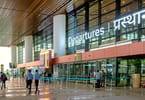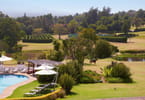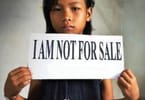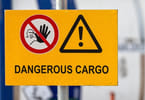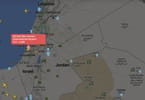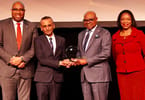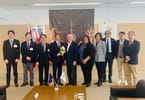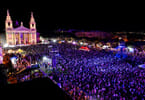eTN reached out to Dr. Eng Walter Mzembi, Zimbabwe’s Minister of Tourism and Hospitality Industry and UNWTO’s Regional Commission for Office (CAF) Chair to get his perspective on tourism and the war on terror.
Hon Mzembi responded with his version of this subject that keeps tourism industry leaders awake at night.
Mr. Mzembi writes:
As we advance into the year 2016, people must surely hope that somehow the world will, this year, get a better handle on addressing the horror of terrorism.
Unfortunately 2016 opened on a tragic note in the struggle to end terrorism, as a suicide bomber exploded a device leaving ten people dead and 15 injured at the major tourist attraction of Sultanahmet square in Instanbul, Turkey.
This followed the recent spate of terrorist attacks in places as far flung apart as Bamako, in Mali, Paris in France, and San Bernardino, California, USA which brought into sharp focus the pervasiveness and deadliness of the terrorist scourge that faces our contemporary world.
The Mali, France and USA attacks are apart from the less reported attacks in other parts of the world like; Timbuktu in Mali, Mogadishu in Somalia, Ra’anana in Israel, Kabul in Afghanistan, Istanbul in Turkey, Abadam in Niger-Nigeria border, Nguetchewe in Cameroon, East Jerusalem, Ariel in West Bank, Geva Binyamin in West Bank, Mindanao in Philippines, Rajshahi in Bangladesh, kimba in Borno State,Nigeria, Huwara in West Bank, Jerusalem in Israel, Kabul in Afghanistan, Homs in Syria, Maiduguri in Nigeria, Madagali in Nigeria, Mardan in Parkistan, Derbent , Dagestan, Russia and Kamishli, in Syria.
All these were in the last two weeks of 2015, rounding up a sad year for humanity.
I find it tragically ironic that the greatest advances by mankind in fast travel and easily accessible information technology, IT, have also facilitated the rapid growth and spread of the deadly horror of terrorism.
Whilst the air bombings of terrorist targets, by western powers, and the carnage on the ground, by various terrorist groups and individuals, have been equally horrendous, it is the response of some polities to the terrorist threat that is the focus of this article. The nature of that response, and the consequences thereof, are of great concern to us who are in business of travel and tourism.
To date some of the responses to the sharp rise in terrorist attacks have been characterised by one theme: “How dare you? We will pursue you, we will find you, and we will annihilate you! We have the power to do just that!”
Following the 9/11 incidents of 2001 in the United States , which events saw the emergence and rise of the scourge of terrorism as we understand the phenomenon today, the then President of the United States , George W Bush set the stage for western response to this threat.
He declared ‘War on Terror’.
That American response to 9/11 has typified the aforesaid polities’ position on the scourge of terrorism, from the 2001 attacks, right down to President Francois Hollande’s response to the Paris attacks which occurred only last November in 2015.
Said Hollande, “we will identify, locate and demolish terrorists along with their organisations. We will deny sponsorship, support and sanctuary to terrorists. Finally, we will diminish the underlying conditions that terrorists seek to exploit”. Tagged at the bottom of this final strategy is a faint ‘We will win the war of ideals’.
Today, fourteen years later, the World is still very far from achieving the objectives of its ‘War on Terror’. If anything, we are even further from achieving those objectives than we were in 2001.
In 2015 the terrorist conflagration, if anything, has become more engulfing and intractable. The fact is that war, in the classic sense, cannot be waged against organizations that are not a conventional state. Even after the establishment of the Islamic State of Iraq and Syria (ISIS), there are still some attacks attributed to entirely independent cells or “lone wolves”
Following the Paris attacks, a Paris Prosecutor spokeswoman said eight extremists were dead, seven of them killed in suicide bombings. Clearly, suicide bombing has become a major weapon in the terrorist armament.
Now, since the greatest threat posed by hard power is death, the terrorists’ shedding of the “fear of death” automatically renders “hard power” impotent. So, was the War on Terror!
Fourteen years after the declaration of “WAR ON TERROR”, one US counterterrorism official commenting on the sophisticated Paris attacks remarked to CNN: “There is great alarm over the apparent methodology and likely planning that would have been required to pull off such a series of attacks”.
It is all bewilderment and amazement following the terrorist attacks at San Bernardino, California, fourteen years after the declaration of “WAR ON TERROR”. One reporter, working on the San Bernadino incident, has written the following on Marquez, the key suspect, “Marquez, 24, is literally the boy next door in this unfolding narrative: He lived for many years with his family in a one-storey beige house directly next to Farook.
Both attended La Sierra High School in Riverside, but several years apart. Neighbors say the two young men would spend hours at a time dismantling and repairing cars on the driveway of Farook’s house.”
Eleven days after the attack, the number of arrests remained at zero. The scope of the conspiracy remains unknown. The global investigation involves scores of police officers and federal agents from the FBI; the Bureau of Alcohol, Tobacco, Firearms and Explosives; and the US Marshals Service. They were trying to piece together the history of Farook, Malik, Marquez, the three suspects in the San Bernadino shooting, and any associates who may have known anything about the couple and their terrorist plot.
One writer, Arie Kruglanski, has observed, “A puzzling feature of the recent Paris massacres is that families and friends of the perpetrators professed no inkling that anything unusual was afoot; no indication that their intimates were embarking on a vicious mayhem of innocents where they themselves will likely die”.
It is ironic that both tourism and terrorism share the common factors of travel and crossing boundaries. Indeed, at a more fundamental level, they share the common objective of addressing humanity’s diversity and differences. The diversity might be racial, cultural, religious,in social norms, in dress codes, systems of governance, or whatever. Whatever the case both tourism and terrorism, seek , each in its own way, to address the perceived diversity or difference.
The difference lies in how the two, tourism, on one hand, and terrorism on the other hand, view and seek to address the ‘self’ as opposed to the ‘other’.
In tourism the ‘self’ seeks ways of comprehending and even experiencing the other, for purposes of mutual understanding and mutual co-existence, be it for a brief and limited period, or for a longer and extended period. In touris ‘self’ largely seeks to deploy SOFT POWER to win over the ‘other’. It highlights commonalities between ‘self’ and ‘other’.
Terrorism on the other hand seeks to distance ‘self’ from ‘other’, and highlights differences between the two. Terrorism is judgemental, seeing ‘self’ as all righteous, and ‘other’ as otherwise. Most fundamentally, terrorism seeks to win over the ‘other’ to its side by coercion or force. It seeks, to deploy its HARD POWER.
Whilst the international community seems, in recent times to have recognised the ultimate superiority of ‘soft power’ over ‘hard power’, it too frequently slips into the terrorist mode of over depending on hard power. This is particularly so when the use of hard power is regarded by the powers- that-be as necessary to demonstrate its ability to protect the “interests” of those that it leads.
This line of thinking, of necessity, immediately broadens our definition of terrorist to anybody who believes that hard power can, or should, be used to win over the ‘other’ to the point of view of ‘self’.
At this stage, it is difficult not to conclude that the world powers will not win the so-called ‘War on Terror’. Fortunately, neither will the terrorists, who never intended to ‘win’ in the first place.
Happily, that stalemate need not last forever. There is a way out of this man-created predicament. However, the solution has to be very long term. What will be critical is staying on the course, requiring a drastic paradigm shift in the management of human diversity.
Efforts to rid the world of the scourge of terrorism should not be confined to the battlefield. IT SHOULD BE A BATTLE TO WIN HEARTS AND MINDS. It should be a battle in which soft power constitutes at least half of the arsenal or armaments deployed.
Besides military campaigns, there are other frameworks to bring about resolution to the conflicts emanating from human diversity – including those driven largely by pervert fundamentalist Islamic groups, who have departed from the very acceptable teachings and values of authentic Islam.
One such framework is based on the principle of non-interference. Global powers, with much hard power, are best advised to engage regarding any diversity or differences, without “interfering” in internal matters of sovereign states which have long won their rights to self-determination. Global powers should be dissuaded from exploiting whatever perceived weaknesses in other people’s way of doing things, as a political tool for achieving self-interests. This is often referred to as cultural interference.
The need to let the “other” do things their own way is vital. The need to let people follow their own cultures is vital. Ban Ki moon, the United Nations Secretary General, speaking on the 2011 World Tourism Day on the theme, “Tourism linking cultures” said as much.
Said Ban Ki-moon…tourism “promotes dialogue and interaction, such contact between people of different backgrounds is the very foundation of tolerance”.
“As we travel, let us engage with other cultures and celebrate human diversity”.
It is unfortunate that some powers have become too interventionist. They do not seem to have learnt that any intervention always has unintended consequences. One intervention always leads to another, in an unending cycle of interventions.
With regards to the current on-going scourge of terrorist attacks, it is notable that the some countries preferred a form of intervention by proxy in the Arab world – training , funding and even arming the ‘moderates’ to fight the ‘radicals’, has largely back-fired. To a large extent it can be said to have created the environment for the emergence of various groups of rogue ‘Islamic’ terrorists.
As one writer has observed, in the 1980’s under President Ronald Regan, the US trained thousands of Islamic extremists to fight against the Soviet Union in Afghanistan. The result was Al-Queda, whose actions ultimately prompted then President George W Bush’s invasion of Afghanistan and provided a pretext for invading Iraq.
As the Secretary of State, Hilary Clinton admitted in 2010: “We trained them, we equipped them, we funded them, including somebody named Osama Bin Laden
————–And it didn’t work so well for us.”
It is argued by some, at times rather convincingly, that, to save themselves from further terrorist attacks, some countries should abandon their handiwork altogether. They should, for instance, ensure the survival of the people of Syria and the government of Syria, in their real War on Terror, whilst engaging the people and their governments, without “interference” in their internal matters. After all, it is the people and government of Syria and the people and government of Iraq who can ultimately defeat the death cult, not those who created it.
Writes one Brahma Chellaney: “And yet, disregarding this lesson, some powers intervened in Libya to topple Gaddafi, effectively creating a jihadist citadel at Europe’s southern doorstep, while opening the way for arms and militants to flow to other countries. It was this fallout that spurred the French counter-terrorist interventions in Mali and the Sahel.
“Having barely stopped to catch their breath, the US, France, and Britain with the support of the Wahhabi States like Saudi Arabia and Qatar – then moved to bring down Syrian President Bashal Al-Assad, fuelling a civil war that enabled the Islamic State to seize territory and flourish”.
The fact is any intervention that takes away a State’s stability, destroys the core essence of a people’s culture, ultimately has unintended consequences of disintegration of the State and exacerbates terrorism. Somalia, Afghanistan, Libya and Iraq are key cases in point.
The emphasis on “engagement” without blatant interference, and without imposition seems to be bringing dividends for Russia’s President Putin in the context of the Syrian War.
According to reports Putin insisted that Russia’s bombing campaign in Syria is to avoid a situation where the removal of a legitimate government would create power vacuums that would be filled by extremists. His goal is to stabilise the legitimate government and prevent its immediate overthrow. Putin, it is said, never meant to help Bashar- al-Assad achieve complete military victory, but only to stave off Syria’s collapse.
Through ‘engagement’ without ‘imposition’ Putin seems to have made some headway in the Middle East. He is now in constructive engagement with centres of power in the region, including Israel!
The international community definitely needs a more measured approach to the terrorist attacks, and that approach must reflect the lessons of past mistakes.
Referring to terrorism attacks as ‘an Act of war’, as President Hollande did, simply plays into the hands of the terrorists, who will not really go to ‘war’ in the classic meaning of that word. Worse still it brings us back to the worship of, and deference to ‘hard power’. Let us go the tourism way and increasingly resort to ‘soft power’.
Following the recent January 2016 attack in Istanbul, world “powers” could only wail. German chancellor, Mrs Merkel mourned, “Today it hit Istanbul, it has hit Paris, it hit Tunisia, it had already hit Ankara”
To its credit Turkey’s government declared a ban on broadcast coverage from the scene.
Detailed repeated broadcast of the scenes of terrorist attacks instils fear and apprehension in the world’s population regarding its future. Meanwhile, instilling fear about the future of the world, under the current order is a major objective of terrorism. They have perfected the art of merchandising fear. In banning continuous broadcast coverage from the scene the Turkey government was actually hitting the terrorists where it hurts most.
In this regard I am reminded of the Turkish government’s thrust, in its capacity as the G20 president, and its focus on Investment,
Implementation and Inclusivity
In their style of governance, some powers need to learn from Turkey and place value on inclusivity, even as they deal with persons of different religions, cultures or even races. Indeed during the G20/T20 Tourism Ministers 6th summit, held under the presidency of Turkey, I was so struck by the hospitality of the people of Turkey and the beauty of their tourism product, that it hurt me immensely to hear, some months later, that the product has been hit by a vicious terrorist blow.
The “inclusive” approach of the G20, under the Presidency of Turkey itself, together with its aversion to giving excessive publicity to terrorist atrocities, speaks volumes of what the international community needs to do in order to win the battle of minds, and avoid the stalking of fear amongst their own people.
In conclusion, I must refer to two recent developments that vividly illustrate my point that there are other frameworks for bringing extremist violence to an end.
The first is about the Casa Colacho of Medellin, Colombia, where community women successfully resisted the muchachos (drug-dealer related para-military groups). Here we have a situation where, on the basis of their sense of what is right or wrong, acceptable or unacceptable, a community commit themselves to a point where the threat of force, hard power, is not a deterrent.
The second incident was in Kenya, where Islamist gunmen of al Shabab held up a Kenyan bus and wanted to separate the Moslems from the Christians, in order to kill the latter. The Moslem passengers, some of whom had given the Christians their garb resisted the move and told the militants to kill them all or leave them alone. Though there were a number of deaths during the incident, the gunmen eventually left.
My point is that when humanity stands together, not on the basis of hard power, but on the basis of its humanness, fundamentalist terrorism can eventually be defeated.
About Hon Eng. Dr. Walter Mzembi
Dr Walter Mzembi (MP) has been Zimbabwe’s Minister of Tourism and Hospitality Industry since 2009. Before then, he was Deputy Minister for Water Resources and Management.
He has indicated a very clear policy direction for Zimbabwe’s Tourism, highlighting the massive potential that the country and Africa as a whole possess in this sector. He has held, and still holds, several high-level positions in a number of international organizations, including: the Presidency of the New York-based Africa Travel Association (ATA). He currently sits on the International Advisory Board of the Berlin based Institute of Cultural Diplomacy (ICD).
A major highlight of his career as Tourism Minister was the successful lobbying and hosting by Zimbabwe and Zambia of the 20th Session UNWTO General Assembly in 2013 which he steered, leading to his election as UNWTO Regional Commission for Africa (CAF) Chairperson. Dr Mzembi currently holds the same position of Chairmanship of CAF following his unanimous re-election to the same during the 21st UNWTO General Assembly held in Medellin, Colombia in 2015.
Minister Mzembi has a passion for wildlife conservation and has contributed to the current UNWTO thought on the issue. He holds BBS and MBA degrees from Azteca University in Mexico. He has just been awarded a doctorate by Aldersgate University College following submission of a thesis entitled ‘An Exploratory Study of Conservation Management in Zimbabwe: A Governance Perspective’.
Dr Mzembi is a Registered Professional Engineer with the Engineering Council of Zimbabwe, a Fellow of the Zimbabwe Institute of Engineers and a Member of the Engineering Institute of Zambia. Walter is a sought after speaker at home and abroad, accredited by the prestigious London Speakers Bureau.
A recipient of numerous national and international accolades and awards amongst them African Tourism Minister of the Year (2011), Public Service Manager of the Year (2012, Zimbabwe Institute of Management), he was recognised as Honorary Academician of the Bucharest-based European Council on Tourism and Trade Academy (2014). He twice voted Best Minister of the Year by an independent Zimbabwean national daily newspaper (2012 and 2013).
WHAT TO TAKE AWAY FROM THIS ARTICLE:
- Timbuktu in Mali, Mogadishu in Somalia, Ra'anana in Israel, Kabul in Afghanistan, Istanbul in Turkey, Abadam in Niger-Nigeria border, Nguetchewe in Cameroon, East Jerusalem, Ariel in West Bank, Geva Binyamin in West Bank, Mindanao in Philippines, Rajshahi in Bangladesh, kimba in Borno State,Nigeria, Huwara in West Bank, Jerusalem in Israel, Kabul in Afghanistan, Homs in Syria, Maiduguri in Nigeria, Madagali in Nigeria, Mardan in Parkistan, Derbent , Dagestan, Russia and Kamishli, in Syria.
- Following the 9/11 incidents of 2001 in the United States , which events saw the emergence and rise of the scourge of terrorism as we understand the phenomenon today, the then President of the United States , George W Bush set the stage for western response to this threat.
- Whilst the air bombings of terrorist targets, by western powers, and the carnage on the ground, by various terrorist groups and individuals, have been equally horrendous, it is the response of some polities to the terrorist threat that is the focus of this article.




